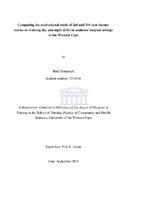| dc.description.abstract | Clinical learning experiences form an integral part of the 2nd and 3rd year learner nurses' training, because it is in the clinical placement that nurses should acquire the knowledge, skills and values that are necessary for professional practice competency. Nurses who are working night shift routinely feel deserted and left out of the information sphere. In most cases, these nurses find themselves in situations of staff shortages, diminished resources and reduced managerial direction. This situation is leading to demotivation. Maslow’s theory in relation to the hierarchy of human needs is regarded as the basic motivators of human activity. Maslow’s theoretical framework of the hierarchy of basic human needs was employed to compare the motivational needs of 2nd and 3rd year learner nurses who were working either night or day shift at the time of data collection. The purpose of the study was to compare the motivational needs of 2nd and 3rd year learner nurses who were working day and / or night shift. The researcher followed a quantitative, descriptive and comparative survey design with a sample of the population. A sample of 2nd year (n = 103) and 3rd year learner nurses (n = 103) was drawn from each group and a 100 fully completed questionnaires were submitted by each group. The researcher gathered the data with the assistance of a self-administered questionnaire that comprised primarily of closed-ended questions and a 5-point Likert scale was employed to capture their responses. The researcher used a structured questionnaire to explore the perceptions of the 2nd and 3rd year learner nurses about their needs to acquire motivation in the workplace in the context of Maslow’s hierarchy of needs. The researcher used descriptive and inferential statistics to analyse the data. Data was plotted and expressed by means of frequency tables. Descriptive statistical analysis and associations between various variables were completed by using parametric tests. The findings of the study were related to Maslow’s hierarchy of needs; i.e. the physiological, safety, social, self-esteem and self-actualisation needs to motivate the 2nd and 3rd year learner nurses during day and night shift. The findings include significant differences between the needs of 2nd and 3rd year respondents in relation to working day and night shift at the health service institutions in the Western Cape Province. In Item 27, the perceived needs of the 2nd and 3rd year respondents to be placed in their units of preference during night shift varied between never to sometimes. The 2nd year respondents (n = 74, 74.0%) and (n = 74, 76.8%) of 3rd year respondents on night shift experienced their need to be placed in a unit of preference to be considered. From the descriptive statistics (Tables 4.15 – 4.220), it was evident that the 2nd year respondents did neither have the highest nor lowest mean values across the study; the observation for the 3rd year respondents was similar. The mean values of night shift respondents mostly scored lower than the day shift mean values. The inferential statistics indicated significant differences between 2nd and 3rd year day shift respondents and between 2nd and 3rd year night shift respondents with night shift depicting more significant differences than day shift. That confirmed that both 2nd and 3rd year learner nurses’ motivational needs of night shift respondents were more pronounced than the needs of day shift respondents. Emerging from this research, recommendations were formulated for clinical educators, nurse educators, unit managers and professional nurses in accordance with Maslow's hierarchy of needs with the purpose of meeting the motivational needs of the 2nd and 3rd year learner nurses at the health service institutions in the Western Cape Province. Validity and reliability principles were applied during the entire research process. The reliability and validity of the research instrument was determined by applying Cronbach's alpha test. The Cronbach alpha coefficients were 0.93 and 0.93 for the day and night shift respondents respectively. Those values were above 70% and close to 100%, which indicated that the questionnaire had been a reliable research instrument. All coefficients of the pilot study were above 70% which indicated that the instrument was consistent and reliable. The reliability of the questions were tested for content and face validity. The researcher observed ethical considerations during the entire research process. Ethical considerations of beneficence, avoiding undue intrusion, the right to privacy, confidentiality, fair treatment, respect for the respondents, the right to freedom and the right to withdraw from the study at any stage, informed consent and protecting respondents from any harm were adhered to. The respondents provided written consent that acknowledged those ethical principles. | en_US |

